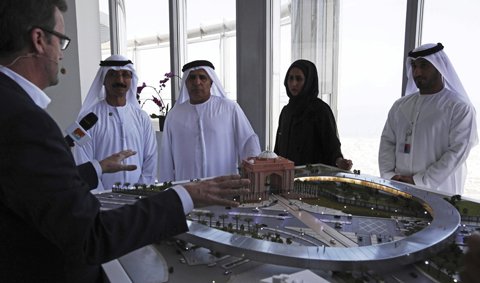New 2021 Gulf rail deadline a ‘moving target’
 Rob Lloyd, the CEO of Hyperloop One, left, shows a model to Emirati officials including Mattar al-Tayer, the director-general and chairman of Dubai's Roads & Transport Authority, third left, in Dubai, United Arab Emirates, Tuesday, Nov. 8, 2016. The futuristic city-state of Dubai announced a deal on Tuesday with Los Angeles-based Hyperloop One to study the potential for building a line linking it to the Emirati capital of Abu Dhabi. (AP Photo/Jon Gambrell)
Rob Lloyd, the CEO of Hyperloop One, left, shows a model to Emirati officials including Mattar al-Tayer, the director-general and chairman of Dubai's Roads & Transport Authority, third left, in Dubai, United Arab Emirates, Tuesday, Nov. 8, 2016. The futuristic city-state of Dubai announced a deal on Tuesday with Los Angeles-based Hyperloop One to study the potential for building a line linking it to the Emirati capital of Abu Dhabi. (AP Photo/Jon Gambrell)DUBAI: A new deadline of 2021 to connect the six wealthy Gulf Arab states by rail is a “moving target”, a United Arab Emirates minister said yesterday, raising further doubts about the stalled project. Gulf officials earlier this year acknowledged that a 2018 completion date would not be met for the 2,100-km passenger and cargo network, which is to stretch from Kuwait down the Gulf coast and through the UAE to Oman, with links connecting Bahrain, Qatar and Saudi Arabia.
The six states, which make up the Gulf Cooperation Council (GCC), have agreed “in principle” to 2021, UAE Minister of Infrastructure Development Abdullah bin Mohammed Al-Nuaimi told reporters at a rail industry conference in Dubai yesterday. Asked whether that date might change, he replied: “I don’t know...It’s actually a moving target.” The project, which would cost tens of billions of dollars and could transform trade and transport in the region, has faced technical and bureaucratic obstacles, and stalled as state budgets tightened because of low oil prices.
In January, the UAE’s state-backed Etihad Rail suspended a tender to build a 628 km second phase of the UAE’s network, which would have connected the country with Oman and Saudi Arabia. That prompted Omani officials to say that rather than focusing on the regional network, they would concentrate on building a domestic rail line linking the ports of Salalah, Sohar and Duqm. Last month, Oman invited international tenders for consultancy work on the project.
Bahrain has pushed back the completion date for its rail link to Saudi Arabia to 2023, Mariam Jumaan, Undersecretary of Land Transport and Post at Bahrain’s Ministry of Transportation, told reporters at the conference. Phase two, linking Bahrain to Qatar, will come “sometime” after that, she said.
Dubai agreed a deal yesterday with a US startup to “evaluate” the construction of a near-supersonic transport link that could slash travel times to Emirati capital Abu Dhabi to minutes. The cash-flush city state, which has recently hosted other hi-tech transport pilots, said it would conduct a “feasibility study” with Hyperloop One to sound out the scheme. The California-based firm hailed yesterday’s “historic” agreement. “We begin to evaluate the delivery of the world’s first hyperloop system across the country,” CEO Rob Lloyd told reporters. “We will initially focus on the value that Hyperloop One will deliver in Dubai and across the (United Arab) Emirates.”
The deal will see both parties explore a route for a vacuum-sealed pod transportation system, which could potentially slash travel times between Dubai and Abu Dhabi – 150 km apart - to around 12 minutes. The system could later be expanded to link the UAE with neighboring Gulf countries so that a trip between Dubai and Saudi capital Riyadh - currently two hours by plane - could be completed in under 50 minutes. Lloyd said his company has also been in talks with transport authorities in Abu Dhabi to discuss the proposal.
While no costs or time-scales were revealed, Lloyd said in a statement that “from a technological point of view, we could have a Hyperloop One system built in the UAE in the next five years”. Mattar Al-Tayer, Dubai Road Transport Authority’s director general, told reporters that the cost of building the system will be “an important factor when making such a strategic decision on whether or not we can have hyperloop” in addition to questions over safety and demand.
Hyperloop is a futuristic passenger and freight transport system that promoters say offers the promise of near-supersonic speeds. Earlier this year, Hyperloop One held a first public test in the desert outside Las Vegas, trying out engine components designed to rocket pods through reduced-pressure tubes at speeds of 1,200 km per hour. The company says the system offers better safety than passenger jets, lower build and maintenance costs than high-speed trains, and energy usage, per person, that is similar to a bicycle.
Last month, port colossus DP World Group of Dubai announced it was investing in the concept, joining backers including French national rail company SNCF, US industrial conglomerate General Electric and Russian state fund RDIF. Home to Burj Khalifa, the world’s tallest tower where yesterday’s conference took place, Dubai is a leading tourist destination in the Gulf, attracting 14.2 million visitors in 2015. In September, it unveiled its first driverless bus service, launching a month-long trial period for the electric vehicle with a view to expanding it across the city state.
Hyperloop One, which has so far raised more than $160 million, was set on an idea laid out three years ago by billionaire Elon Musk, the entrepreneur behind electric car company Tesla and private space exploration endeavor SpaceX. Rival company Hyperloop Transportation Technologies is also studying ways to introduce the technology in the UAE, chairman Bibop Gresta told Reuters. – Agencies










